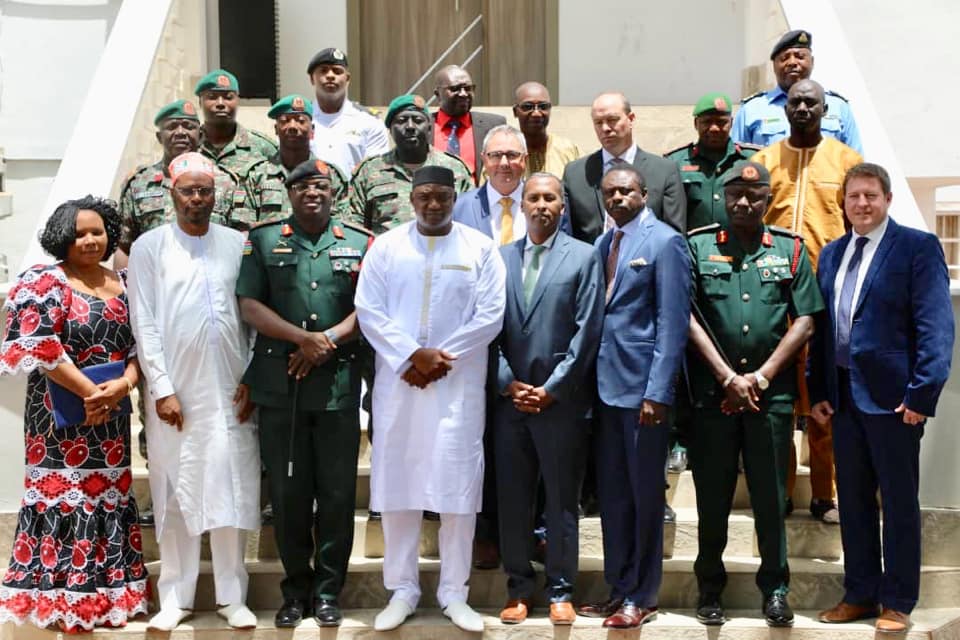
Meet President Barrow’s Security Service Chiefs
The effectiveness of a nation’s security agencies is undeniably influenced by the leadership of their respective service chiefs. Competent leadership is paramount, as it directly impacts the ability of a security apparatus to defend a nation’s territorial integrity, maintain law and order, and safeguard national interests.
Effective security leadership is rooted in a combination of education, experience, ethical conduct, and strategic foresight, which collectively enhance the ability of these agencies to respond to both internal and external threats.
Conversely, a lack of effective leadership can result in weakened security responses, diminished public trust, and increased vulnerability to both internal and external threats. Here is a detailed analysis of each agency, along with an assessment of the performance of the service chiefs in their respective roles. This examination will highlight the strengths and shortcomings of their leadership and its impact on national security.
Major General Mamat O. A. Cham: Chief of Defence Staff (CDS)
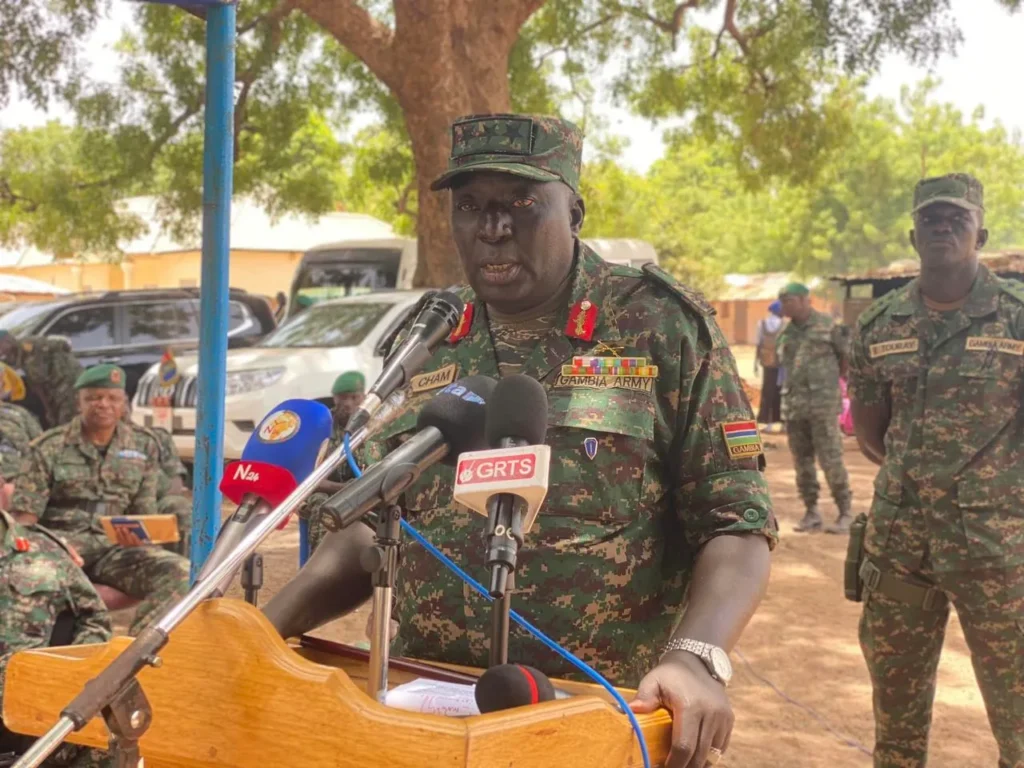
Major General Mamat O. A. Cham is the current Chief of Defense Staff of the Gambia Armed Forces (GAF). His leadership is grounded in extensive military training, both domestically and internationally, where he has honed skills in leadership, strategy, and operational command.
Cham’s experience in various command positions within the GAF, including his role as Deputy Chief of Defence Staff, has provided him with a deep understanding of the operational needs of the armed forces. He has played a pivotal role in key decisions related to national defence and has overseen military operations both within The Gambia and in international peacekeeping missions.
While Major General Cham’s dedication to the GAF is unquestionable, his leadership is severely constrained by his lack of formal education beyond secondary school. In today’s complex security environment, where strategic thinking and advanced military knowledge are essential, this educational gap significantly undermines his ability to lead the armed forces effectively.
His limited academic background raises concerns about his capacity to manage the intricacies of modern defence strategies, thereby leaving the GAF ill-prepared to address contemporary security challenges. It is worth mentioning that Cham has surpassed the mandatory retirement age. His continued service is primarily due to President Barrow’s paranoia, fearing that younger army officers—who possess the necessary training and educational credentials—might not be as pliable to his demands.
Under Cham’s leadership, the GAF has been significantly diminished in its role and capabilities, with the primary functions of the military being usurped by the ongoing presence of ECOWAS forces. This situation begs the question: why is national security being outsourced to foreign contingents when The Gambia has an army?
The reliance on external forces not only undermines the sovereignty of the state but also casts doubt on the effectiveness and purpose of the national military under its current leadership
Seedy Mutarr Touray: Inspector General of Police (IGP)
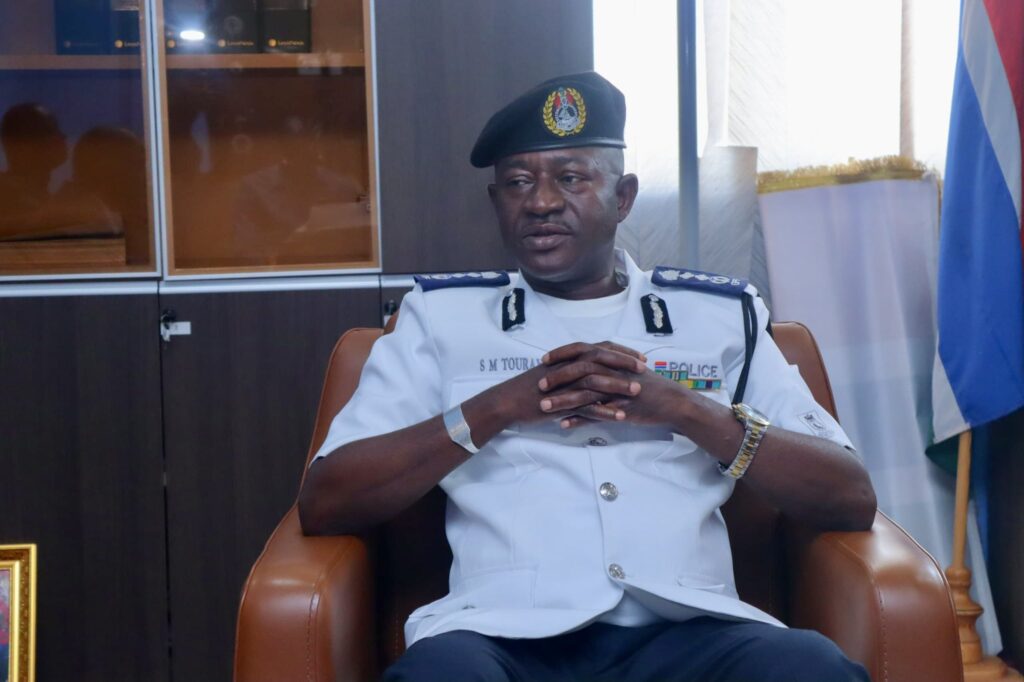
Seedy Mutarr Touray currently serves as the Inspector General of Police (IGP) for the Gambia Police Force (GPF). Despite his years of service and deep operational knowledge, particularly within the Immigration Department, Touray’s transition to leading the Police Force has been less than seamless.
His extensive background in immigration does not align well with the multifaceted demands of policing, which require a deep understanding of law enforcement, public safety, and criminal justice. This mismatch is further highlighted by the fact that even within the Police Force, the current Public Relations Officer possesses a higher level of education than Touray, underscoring a significant disparity in qualifications within the leadership structure.
Touray’s appointment appears to be more politically motivated than merit-based, reflecting a broader trend in President Barrow’s administration, where political appointees are often used as instruments to serve specific agendas rather than being chosen for their competence and leadership ability.
Like Major General Cham, IGP Touray’s lack of post-secondary education is a critical shortcoming. The role of a modern police chief requires not only experience but also a thorough understanding of criminal justice, forensic science, and international law enforcement standards — areas where formal education is indispensable.
Touray’s educational deficiencies, coupled with the systemic operational challenges within the GPF, severely hamper the force’s ability to effectively maintain law and order, which is essential for national security.
Since assuming office, Touray’s leadership has been about as effective as a leaky bucket in a rainstorm. His tenure has been marked by a series of missteps, the most egregious of which is the recent round of promotions within the force.
In a stunning display of favouritism, competent and deserving officers were sidelined, while those with questionable qualifications were elevated. The very individuals whose families fought for regime change were overlooked, while those connected to former regime loyalists found themselves promoted. A prime example is Momodou Sabally’s sister, Gass Sabally, who was promoted despite lacking merit, seemingly due to Sabally’s close ties to those in power.
Instead of appointing political puppets to key positions, President Barrow would do well to draw from the pool of educated, young, and experienced professionals who are abundantly available in the country.
These individuals are better equipped to handle the complexities of modern law enforcement, which is crucial for maintaining law and order. Under Seedy Touray’s leadership, the Gambia Police Force is unlikely to rise to the challenges of modern policing, leaving the nation vulnerable to a range of security threats.
It is high time that President Barrow reconsiders Seedy Touray’s role within the government. Rather than continuing in a position for which he is ill-suited, Touray should be redeployed to a sector more aligned with his experience, such as immigration, where his skills might be more effectively utilised.
In his place, a new leader should be appointed—someone with advanced academic qualifications in national security and a proven track record in modern policing. Such a figure would be far better positioned to reform the GPF and ensure that it meets the demands of contemporary law enforcement, ultimately enhancing the safety and security of the nation
Ebrima Mboob: Director General of Gambia Immigration Department (GID)
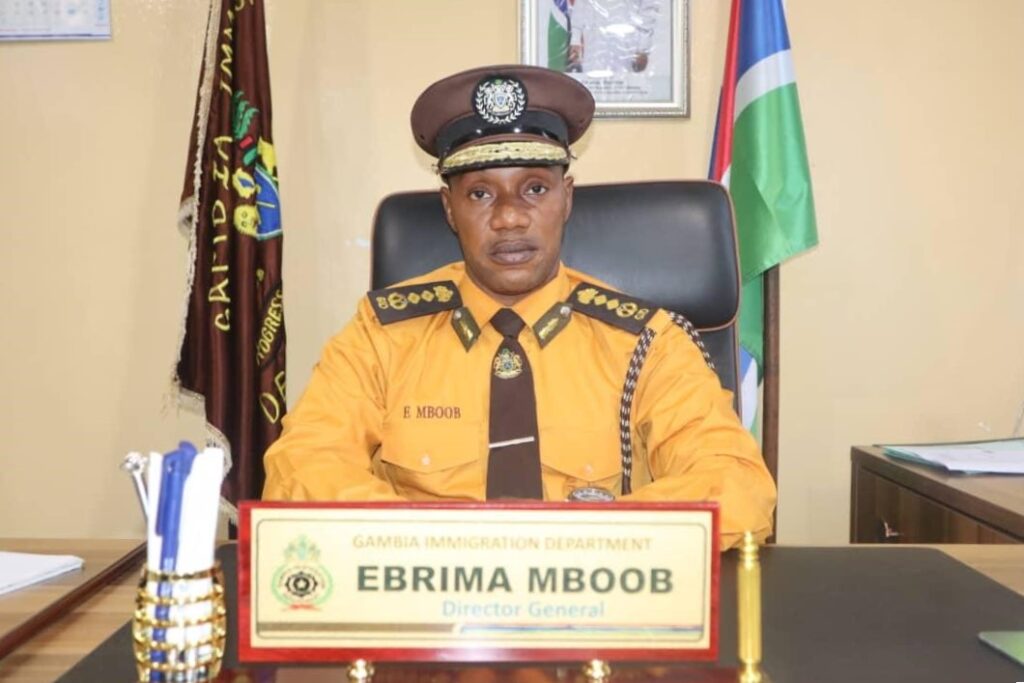
Ebrima Mboob currently serves as the Director General of the Gambia Immigration Department (GID). With extensive experience in immigration management, Mboob has held various positions within the GID, where he has been involved in key aspects of border security, immigration law, and the administration of immigration policies.
His academic background includes qualifications in business administration and security studies, which have provided him with a solid foundation for managing the complexities of immigration control and border security.
Despite his efforts to modernise the department and improve its efficiency, the GID remains plagued by persistent corruption and operational challenges. The lack of a strong stance against corruption within the government has further exacerbated these issues, leading to what is often regarded as one of the worst periods for the GID.
While Mboob has initiated some reforms, the broader environment of lax anti-corruption measures continues to hinder significant progress within the department. GID is today ever before rated as the most corrupt public sector institution in the Gambia.
Ansumana Manneh: Director General of Gambia Prison Service (GPS)
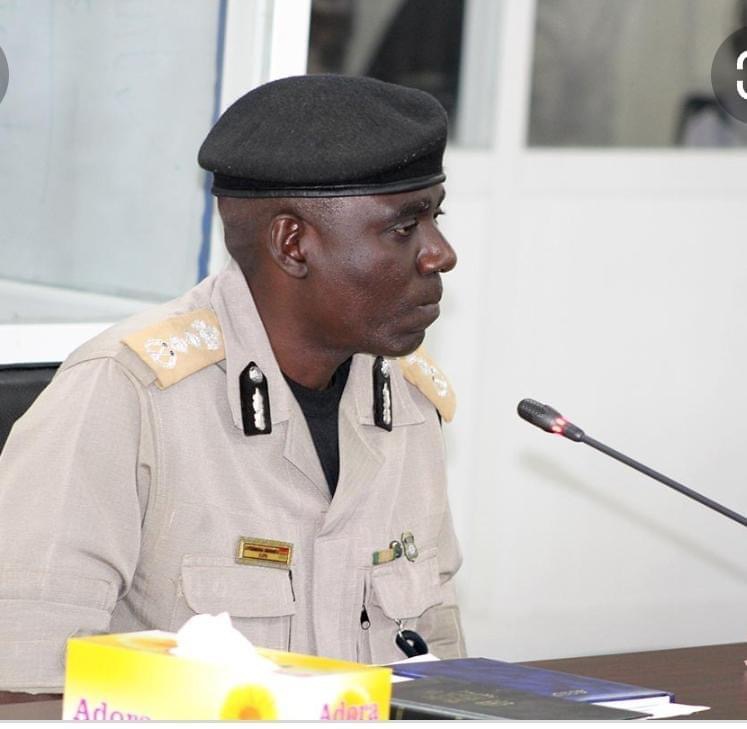
Ansumana Manneh holds the position of Director General of the Gambia Prison Service (GPS) at the time of preparing this paper. With a long career in prison administration, Manneh has accumulated substantial experience in managing prison facilities and overseeing inmate rehabilitation programs.
His expertise extends to addressing critical issues such as overcrowding and the poor living conditions that have plagued the prison system in The Gambia for years.
Manneh has also received professional training in corrections management, human rights, and inmate rehabilitation, equipping him with the necessary skills to attempt reforms within the GPS.
Under his leadership, several initiatives aimed at improving prison conditions and ensuring adherence to human rights standards have been introduced.
However, these efforts have been met with mixed results, as the structural and resource-related challenges within the GPS are deeply entrenched.
Despite his experience and commitment to reform, Manneh’s leadership is constrained by systemic issues that persist within the prison system. Overcrowding, inadequate facilities, and insufficient resources continue to undermine the effectiveness of the GPS, limiting the impact of the reforms that have been implemented.
Furthermore, the broader context of governance in The Gambia, which has often been characterised by a lack of strong institutional support, has further complicated efforts to bring about meaningful change within the prison service.
Like many of his predecessors, Manneh’s educational qualifications are limited to secondary school. However, what he lacks in academic credentials has been somewhat offset by his innovative thinking — an attribute notably absent in the leadership of the GPS in previous years.
Under Manneh’s guidance, the GPS has witnessed a few noteworthy reforms. The abolition of torture, once a horrific standard practice, is a significant advancement.
Furthermore, partnerships with both local and international bodies have been established, aiming to enhance the operational quality and management of the prison system. These changes align with some of the fundamental principles of contemporary penology, particularly the focus on human rights and the humane treatment of inmates.
Yet, when evaluated against modern international correctional standards, Manneh’s reforms appear rather modest. While eliminating torture is a commendable step forward, it represents just a fraction of the comprehensive overhaul needed to transform the GPS into a truly modern correctional facility.
Persistent issues, such as extreme overcrowding and inadequate infrastructure, remain inadequately addressed. The incremental nature of these reforms underscores a broader issue: substantial progress remains elusive due to persistent systemic problems.
In recent years, the efforts of public figures such as former prisoner and celebrity Bob Keita have brought renewed attention to the dire conditions within The Gambia’s prison system.
Keita and others have galvanised public awareness and advocacy, emphasising the critical need to support and reform public institutions like the GPS. Their activism underscores the growing recognition among Gambians of the necessity to address the deficiencies within the prison system and advocate for more comprehensive reforms.
The involvement of such high-profile figures in raising awareness about the state of the prison system reflects a broader societal push towards demanding accountability and improvements in public institutions.
However, despite these efforts, the fundamental issues within the GPS persist, suggesting that significant challenges remain in achieving the level of reform required to align with international standards of correctional facility management.
The situation calls for a more robust and sustained commitment to addressing both the systemic issues and the operational shortcomings that continue to undermine the effectiveness of the Gambia Prison Service.
Ousman Sowe: Director General of State Intelligence Service (SIS)
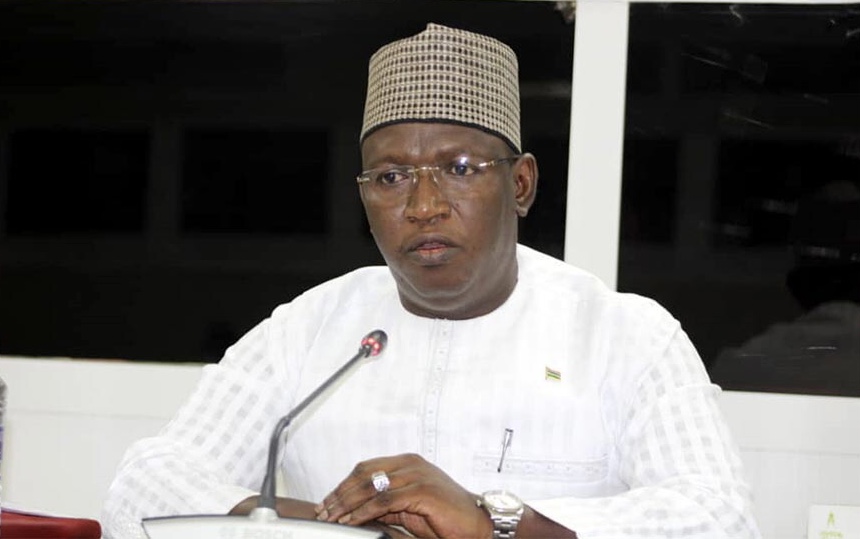
Ousman Sowe currently serves as the Director General of the State Intelligence Service (SIS), bringing with him a considerable background in intelligence and security. His career within the intelligence community, combined with his academic credentials in security studies and intelligence, positions him as a leader ostensibly well-suited to steer the agency through necessary reforms.
However, despite these qualifications, Sowe’s leadership has been fraught with issues that suggest he may be fundamentally unsuited to effect the transformative change the SIS requires.
Philosophically, Sowe’s leadership might be likened to the concept of the “Philosopher King” as envisioned by Plato — an individual whose knowledge and wisdom should, in theory, make him an ideal ruler.
However, in practice, his tenure reflects the limitations of this ideal when confronted with the practical demands of governance. The grand visions of reform and modernisation, while intellectually sound, have struggled to take root in the agency’s day-to-day operations.
This situation highlights the perennial tension between theoretical knowledge and practical governance, where the ideals of leadership, though well-intentioned, often falter in the face of entrenched institutional challenges.
As a result, Sowe’s leadership underscores the difficulties inherent in bridging the gap between academic theory and the pragmatic requirements of effective intelligence management.
Sowe’s longstanding association with the Jammeh regime places a heavy burden on his tenure.
During Jammeh’s rule, the intelligence apparatus was deeply implicated in numerous human rights abuses, including extrajudicial killings, torture, and widespread repression. Sowe’s involvement, whether direct or indirect, in this system undermines his credibility and hampers his ability to lead a meaningful departure from the past.
While he may possess the technical skills and theoretical knowledge necessary for his role, his history taints his leadership, making it difficult to inspire confidence both within the SIS and among the broader Gambian public.
While Ousman Sowe possesses the credentials and experience one might expect of a leader in his position, these qualities have not translated into effective leadership of the SIS. His past associations, lacklustre approach to reform, and reluctance to make the necessary bold changes leave the agency mired in the very problems it needs to overcome.
As a result, true reform within the SIS seems unlikely to take shape under his leadership, and the agency remains adrift, unable to fulfil its vital role in safeguarding the nation’s security.
One might wonder why President Barrow continues to recycle former Jammeh apologists into key positions within his administration, despite the glaring contradictions this creates. Perhaps, in his quest for continuity, Barrow sees value in keeping the old guard close, under the mistaken belief that experience, even tainted, is preferable to untested hands.
Or perhaps, he simply enjoys the irony of turning Jammeh’s former enforcers into the keepers of his own regime. If this trend continues, it would only be fitting to roll out the red carpet for Jammeh himself to return as the national security adviser, given how comfortably his former underlings are thriving under Barrow’s leadership. After all, why stop at recycling when you can bring back the original source of all things that plagued the nation?
Sang C. Ndow : Chief Fire Officer of Gambia National Fire and Rescue Service (GNFRS)
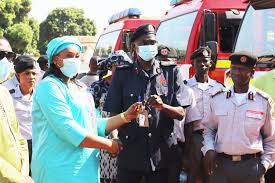
Sang C. Ndow is the Chief Fire Officer of the Gambia National Fire and Rescue Service (GNFRS). With a career spent in the fire service, Ndow has gained extensive experience in fire management, emergency response, and disaster preparedness. His rise through the ranks has provided him with a detailed understanding of the operational challenges faced by the GNFRS.
Ndow has undergone specialised training in fire safety, emergency management, and leadership, equipping him with the necessary skills to effectively lead the GNFRS. As Chief Fire Officer, he has been a vocal advocate for improving resources and training for the fire service, recognising the critical need for better equipment and infrastructure.
His qualifications and experience make him well-suited to address the challenges facing the GNFRS, particularly in enhancing emergency response capabilities. Unlike some of his counterparts, Ndow has demonstrated effectiveness in his role; however, his agency has historically been given less priority dating back to the regimes of Jawara and Jammeh, and this trend has continued under Barrow.
In Western countries, firefighters are held in high regard as the first line of defence in emergencies, but in The Gambia, the Fire and Rescue Services have been consistently underfunded and undervalued.
Despite these challenges, Ndow has managed to maintain some level of operational capability within the department, though the lack of resources and political will to prioritise the agency severely hampers its effectiveness. The continued neglect of this critical service leaves The Gambia vulnerable to disasters that could otherwise be mitigated with a well-supported and equipped fire service.
Demba Ceesay: Director General of National Drug Law Enforcement Agency (DLEAG)
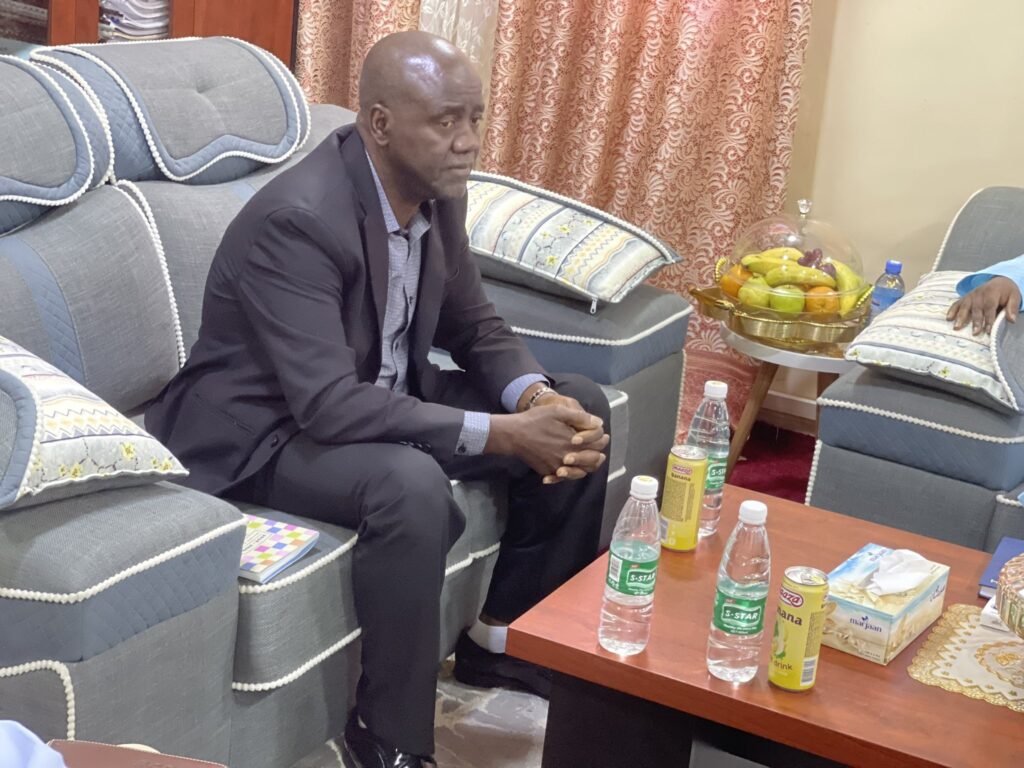
Demba Ceesay, the newly appointed Director General of the National Drug Law Enforcement Agency (DLEAG), brings a nuanced perspective to this pivotal role. His prior position as administrative director within the agency provided him with an intimate understanding of its internal dynamics and challenges.
Ceesay’s leadership thus far has been characterised by an intention to revitalise the agency, aiming to modernise its operations and enhance its efficacy in combating drug trafficking and abuse.
Despite his commitment to reform, Ceesay faces significant hurdles. The DLEAG has long been beleaguered by entrenched issues such as corruption, limited resources, and insufficient training for its staff.
These persistent problems have severely constrained the agency’s ability to effectively address the complexities of drug enforcement in an increasingly sophisticated and globalised drug trade.
In The Gambia, where drug trafficking routes intersect with local markets and drug abuse rates are rising, Ceesay’s efforts are crucial but fraught with challenges. His ability to lead the DLEAG through this critical period will be tested by the agency’s need for comprehensive reform and a more strategic approach to both domestic and transnational drug issues.
The efficacy of his leadership will ultimately determine the agency’s capacity to address the pressing drug-related challenges facing the country and restore its operational integrity.
Thus, assessing the impact of his leadership will require a more extended period to observe changes in the agency’s operational efficiency, its success in tackling drug trafficking, and improvements in its resource management and personnel capabilities.
The complexities of the drug trade, including its transnational dimensions and the sophistication of trafficking networks, will play a crucial role in determining the agency’s ability to respond effectively under Ceesay’s direction.
Thus, while initial efforts and intentions are noteworthy, a comprehensive evaluation of Ceesay’s tenure necessitates a longer-term perspective to accurately gauge the impact of his reforms and leadership.
By Arfang Madi Sillah, Washington DC
Disclaimer:
The views expressed in this article are entirely those of the author and do not necessarily reflect the official policy or position of any affiliated institutions or organizations. The author takes full responsibility for the opinions and analysis presented herein. The author holds several academic degrees, including an undergraduate degree in English literature and literary theory.
Read Part One & Two of this article here and here.










Recent Comments